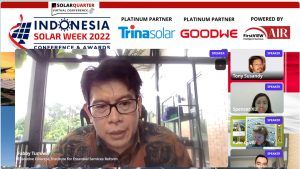The issue of government policies of the Minister of Energy and Mineral Resources Regulation No. 49/2018 in terms of rooftop solar in Indonesia since 2018 has proven to have increased the adoption of PV mini-grid roofs from initially only 609 customers in 2018 to 4,262 customers in 2021. In 2021, the Minister of Energy and Mineral Resources (MEMR) revised regulation No. 49/2018 to Regulation No. 26 of 2021.
“The implementation of the MEMR Regulation No. 26 of 2021 is expected to boost the development of the rooftop solar PV market, especially with the stipulation of a target of 3.6 GW of rooftop solar power in the National Strategic Project (PSN),” said Fabby Tumiwa, Executive Director of the Institute for Essential Services Reform (IESR) in the Indonesia Solar Week 2022 (10/2/2022). He is also the Chairman of the Indonesian Solar Energy Association (AESI).

The MEMR Regulation No. 26 of 2021 is the third revision of MEMR No. 49/2018. The Minister of Energy and Mineral Resources Regulation No. 26 of 2021 has been issued since August 20, 2021. After experiencing a delay in ministerial approval finally, it was agreed to be implemented on January 18, 2022. The following is a comparison of the improvement in the provisions of the three MEMR Regulations:
[table id=79 /]
The government hopes that the improvement of the rooftop solar regulation will encourage the achievement of the target of 3.6 GW of PV mini-grid by 2025. The target of 3.6 GW of rooftop solar is the MEMR proposal that is included in the National Strategic Project as stated in the Coordinating Ministry for Economic Affairs Regulation No. 7 of 2021. The potential positive impacts of the projected growth of 3.6 GW Rooftop PLTS include absorbing 121,500 workers and reducing Greenhouse Gas (GHG) emissions by 4.58 Million Tons of CO2e.
As part of the implementation of the MEMR Ministerial Regulation No. 26/202, Fabby encouraged the government to immediately establish a solar rooftop Customer Center per article 26 of the MEMR Ministerial Regulation. In addition, Fabby hopes that the solar rooftop application process and permits are clear and concise following the latest provisions. On the other hand, problems that are often faced by potential customers such as the length of time to obtain an Exim meter can also be overcome, thereby increasing the installation of rooftop solar power plants in the future.

